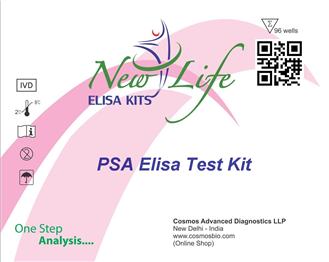
Pack Size : 96 Well
Package Kit Components :
Usage : The New Life PSA ELISA Kit is intended for the quantitative measurement of PSA in human serum.
Description : Prostate Specific Antigen (PSA) is a single chain glycoprotein produced by epithelial cells of the prostate gland. PSA is useful in the management of patients with prostate cancer. The measurement of serum PSA has become the most accepted test to indicate men who are at risk of having prostate cancer and who should be examined by other tests. Using a cut-off of 4 ng/ml, 92% of men over 50 years of age with malignant prostatic tissues, 8% of healthy men and 28% of men with benign prostate hyperplasia (BPH) test positive for PSA. Three major forms of PSA exist in the serum: free PSA, bound PSA and complex PSA. Bound PSA is found in higher concentrations in patients with prostate cancer; whereas, free PSA is detected in higher concentrations in patients with BPH. If the free PSA to total PSA ratio is >25%, it is unlikely that the patient has prostate cancer; whereas, if free PSA is <16% then prostate cancer is likely to be the cause. Serial measurement of PSA concentration in the serum is an important tool in monitoring patients with prostatic cancer and determining the potential and actual effectiveness of surgery or other therapies, or may allow for earlier discovery of residual or recurrent carcinoma after radical prostatectomy or radiotherapy. Current indications suggest that men over 50 years should be screened with digital rectal examination and PSA. Men with a high risk of prostate cancer, such as a family history or of African heritage, should begin annual testing at age 40 years. If both are normal, the patient can be followed with annual evaluations and monitoring to determine the rate of change. Slight elevations in PSA (4.1 ng/ml to 10.0 ng/ml) warrant a transrectal ultrasound (TRUS) to evaluate prostate volume and echogenicity of the gland. Hypo-echogenic lesions should be biopsied. Elevated PSA density (>0.15 ng/ml/cc), very high PSA (>10 ng/ml) or a free-to-total PSA ratio of <16% warrants systemic biopsy.